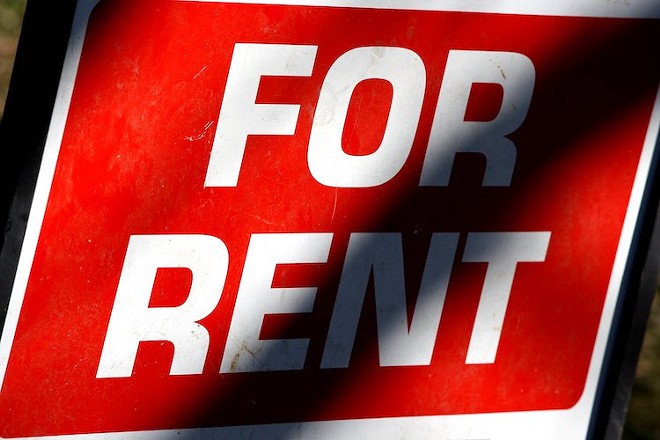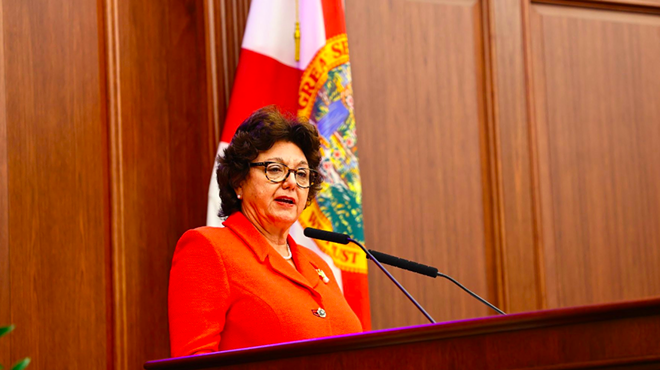Florida lawmakers on Wednesday advanced a sweeping housing bill through the Senate Appropriations Committee that would, among other things, prevent local governments from implementing rent control — a move that some housing advocates say directly targets Orange County.
The bill, SB 102, would prohibit local governments in Florida, such as cities and counties, from enacting ordinances, measures or other rules that would “impose” caps on rent increases. (If you consider limits on how much the rent can be raised on a sitting tenant, and how often, an "imposition" — you must be the landlord.)
This type of policy, commonly referred to as rent control or rent stabilization, is already difficult to enact under Florida law, but Republican lawmakers — and several of their generous campaign donors — believe it’s worth going further, by removing the possibility of rent control altogether.
Currently, under state law, cities and counties can pursue the process of imposing rent control temporarily, for one year, in emergency situations where it's determined “necessary” and “proper” to address a housing crisis “so grave as to constitute a serious menace to the general public.”
If readers recall, Orange County leaders tried to do this last year through a modest, county-wide ballot initiative that would have imposed a one-year cap of 9.8% on rent increases for an estimated 104,000 apartments in Orange County. And, despite a $2 million dollar opposition campaign launched by real estate lobbying groups like the Florida Realtors — which, unsurprisingly supports SB 102 — that initiative got the support of nearly 60% of Orange County voters in 2022.
It got more votes in Orange County than Florida Gov. Ron DeSantis, his Democratic opponent Charlie Crist, or former U.S. Rep. Val Demings, a former Orlando police chief and wife of Orange County mayor Jerry Demings.
Housing justice advocates with groups like Florida Rising and the Central Florida Jobs with Justice say the rent control provision in SB 102 is unnecessary and a slap in the face to the more than 226,000 Orange County voters who supported the county's rent stabilization proposal in November, not to mention advocates who unsuccessfully pushed for similar rent controls in Tampa and St. Petersburg.
“By taking away our freedom to regulate rent policies, to regulate rent prices, you're directly undermining the will of the voters of Orange County, who voted overwhelmingly in support of common sense consumer protection. This pre-emptive state mandate is a false solution,” said Jackson Oberlink, with Florida Rising, on Wednesday. “Instead, we ask that you include in this bill proven solutions that would directly benefit Florida renters, such as capping security deposit at one month's rent, stopping application fee abuse from landlords, banning discrimination against tenants based on their source of income, and regulating price gouging of vulnerable renters by predatory companies.”
But the real kicker is that this bill would do more than completely pre-empt rent control, and that’s why both it and its companion bill in the Florida House are likely to pass with bipartisan support.
To make it more palatable to lawmakers across party lines — Democratic Sen. Jason Pizzo on Wednesday called it an “awesome bill” — the legislation would also earmark $711 million for affordable housing programs, and offer additional incentives for private developers to build affordable housing. It would give tax incentives to developers in exchange for lower-than-market-value rental rates on their projects.
“This is a transformative bill,” said Mark Hendrickson, with the Florida Association of Housing Finance. “It is, along with the Sadowski Act, the most important state legislation for housing. It is a wonderful bill, and it puts again Florida back in the leadership on affordable housing compared to any other state in the nation.”
Over the last two years, Florida has been a hotspot for some of the most egregious rent hikes in the nation, particularly in cities like Miami, Orlando and the Tampa Bay metro area. According to Florida TaxWatch, Florida's median rent rose 36% from the first month of 2020 to December 2022. In 2021 alone, median rent spiked 29% from $1,266 in January to $1,635 by the year's end.
“As our state continues to grow, we need to make sure Floridians can live close to good jobs, hospitals, schools, critical centers of our community that fit comfortably within their household budgets,” said Republican Sen. Alexis Calatayud, the Senate bill’s sponsor, on Wednesday.
The proposal, dubbed the “Live Local Act,” was first floated by Senate President Kathleen Passidomo last month, before it was formally introduced by Calatayud, a first-term senator from South Florida. It was unanimously approved by a bipartisan Senate committee earlier this month, 9-0.
It’s supported by groups like the Florida Chamber of Commerce, the Florida Restaurant & Lodging Association, and the Florida Realtors — which, in addition to suing Orange County over its rent stabilization ordinance (that’s still an ongoing court battle), donated $34,000 to the campaign fund and PAC of Sen. Passidomo between 2019 to 2022, and at least $10,500 to Sen. Calatayud’s 2022 campaign, according to Orlando Weekly's analysis of contribution records through the Florida Division of Elections office.
Locally, it’s rubbed some people the wrong way. In an opinion piece for the Orlando Sentinel, Orange County Commissioner Emily Bonilla — who helped spearhead the county’s rent stabilization ordinance — wrote, “Housing instability profoundly affects our lives, families, communities, and economies. If state lawmakers aren’t going to do something about it themselves, they should at least stop interfering with local efforts to address this crisis.”
Florida Watch, a progressive watchdog group, said in a statement Wednesday morning, “This state mandate would take away another tool for local communities, at the request of corporate landlords and big real estate interests.”
Bonilla, in her op-ed, added that the bill isn’t entirely terrible, but that it needs to be amended to have the rent control pre-emption provision removed. “[The bill] provides incentives for investments in affordable housing, including for seniors, military members, and young adults aging out of foster care. It also directs more funding to various state housing programs. But blocking local initiatives on rent increases is a poison pill that should be stripped from the bill.”
Opponents of rent control, including real estate interest groups, broadly say the policy causes instability in housing markets, driving developers away and decreasing available housing supply.
An issue of supply and demand in Florida, a state that saw a massive influx of residents during the pandemic, is considered by some experts to be one of the driving factors driving rent hikes. (Greed, or the sheer number of homes that are simply bought up and left vacant, is less often mentioned.)
Advocates for rent stabilization measures say the policy can help keep people in their homes, which can serve as a place of comfort, familiarity, and safety for individuals and their loved ones, according to Jonathan Alingu, executive co-director of the Central Florida Jobs with Justice coalition.
“Removing the ability to have a stabilized rent means these leaders are pricing Floridians out of safety,” Alingu told Orlando Weekly.
Moreover, SB 102 opponents denounce it for the power it strips away from local governments to enact a measure that could be right for their community at a particular time when folks are facing staggering rent hikes, eviction, homelessness or displacement.
The number of homeless public school students in Central Florida jumped dramatically last year, according to the Orlando Sentinel, which also reported that in 2022, about 16,000 evictions were filed in Orange County alone.
A statewide poll of 1,250 Florida voters, conducted last year by the Local Progress Impact Lab, found that 8 out of 10 voters agreed that the state should limit rent increases. This was true across party lines, with 75% of self-described conservative, 82% moderate, and 90% of liberal respondents saying they somewhat or strongly believed there should be a limit on rent increases.
“We deserve the freedom to make decisions in our everyday lives,” said Alingu, whose coalition includes a wide range of labor, racial justice, and social and economic advocacy groups. “What it says to those struggling is that legislators in conjunction with corporate CEOs are focused on taking that away from communities in order to maximize their own profits.
But, with zero “No” votes, 17 state senators of the Senate Appropriations Committee today decided to look past (or otherwise welcome) the rent control pre-emption provision of the bill and voted it through, setting it up for a hearing by the full Florida Senate as early as the first week of the 2023 legislative session.
This advancement of this bill here in Florida happened the same day that Boston City Council members heard a rent control proposal from the city's mayor, which would allow for annual rent increases of 6 percentage points more than inflation, with an overall limit of 10% in high-inflation years. Some activists there have argued it doesn't go far enough, and still excludes many renters' landlords, but it still advanced on Wednesday with another hearing scheduled for next month.
Coming soon: Orlando Weekly Daily newsletter. We’ll send you a handful of interesting Orlando stories every morning. Subscribe now and don’t miss a thing. Follow us: Google News | NewsBreak | Instagram | Facebook | Twitter





